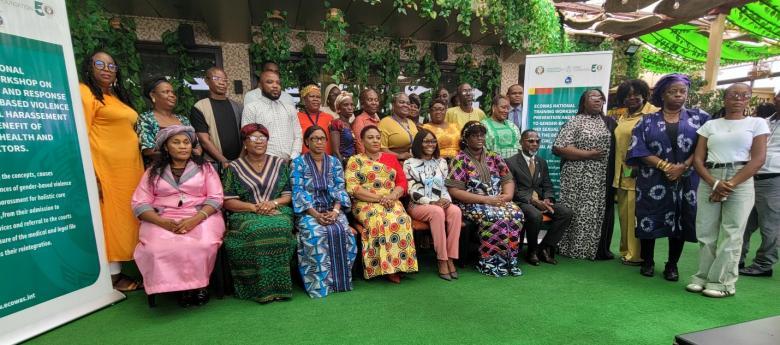Africa-Press – Liberia. ECOWAS Resident Representative Ambassador Josephine Nkrumah has warned that Liberia—like the rest of West Africa—continues to grapple with a deeply rooted culture that sustains gender-based violence (GBV), rather than just isolated incidents of abuse.
Delivering her address at the opening of a four-day National Training Workshop for judicial, health and social actors on preventing and responding to gender-based violence and sexual harassment, Ambassador Nkrumah emphasized that GBV is not an isolated act, characterizing it as a social epidemic embedded in centuries of harmful norms.
“Gender-based violence is not an isolated act. It reflects a system of domination and control rooted in gender stereotypes and patriarchal structures. This imbalance of power perpetuates inequalities and fosters violence,” she stated.
She highlighted that violence thrives in homes, workplaces, religious settings, and communities because society has normalized the behavior of perpetrators.
“Everywhere you find gender-based violence, you will realize that these acts have gone unpunished multiple times, creating a culture of tolerance that makes it seem acceptable,” she added.
Ambassador Nkrumah stressed that gender-based violence is not unique to Africa.
“Sufficient data suggests that gender and sexuality-based violence is a global phenomenon, not an African trait. However, in Africa, we must begin to collectively address this issue coherently, starting from home and extending to workplaces,” she urged.
Ambassador Nkrumah called for broadening the conversation to include boys who witness violence at home, stating that they are silent victims. “A young girl or boy who consistently witnesses domestic violence is more likely to become a perpetrator themselves. They are victims in their own right, growing up in an environment where violence is the norm,” she explained.
She warned that even adults who witness repetitive violence can become desensitized and may turn a blind eye.
Ambassador Nkrumah described the challenges of identifying survivors, stressing the importance of recognizing the signs. “Many victims hide their suffering well. They may appear fine on the outside, but the pain inside is real. It is essential to be attentive to the signs of violence victims,” she noted.
She urged Liberia’s justice, health, and social welfare professionals to act as the first line of detection, response, and support.
Ambassador Nkrumah reminded workshop participants that the training must have lasting effects, stating, “You are expected to develop and conduct training sessions for your colleagues. Too often, we attend workshops, gain knowledge, and never share it with others.”
She encouraged them to become ambassadors beyond their workplaces: “This must become part of your lifestyle—in churches, mosques, and sports arenas. You must be advocates fighting against gender-based violence.”
Ambassador Nkrumah added, “We can break the silence, dismantle stereotypes, and build a future where every woman, man, boy, and girl can live in safety and dignity.”
The ambassador commended Liberia for expanding national prevention and response services, but warned that sustainability requires a commitment to funding. “No matter how much we train, without budgetary support for these interventions, our efforts will be in vain,” she said.
She concluded, “Gender-based violence affects us all. It impacts our productivity and well-being, and ultimately, society as a whole bears the consequences.”
In her keynote address, Deputy Minister for Gender, Children, and Social Protection, Atty. Laura Golaken, focused on data systems, national reforms, and Liberia’s commitments under the government’s AAID development blueprint.
She underscored the importance of reliable statistics in policymaking: “All of us in this space know that data is crucial. It will inform our work, guiding where and how we operate.”
Deputy Minister Golaken announced that the ministry is finalizing a groundbreaking Gender-Based Violence Information Management System (GBV-IMS). “This system will provide real-time data. Anyone can access the information and see case prevalence, for instance in Grand Bassa County. This will enable us to focus our efforts where they are needed most,” she explained.
She praised the European Union and the United Nations for supporting the Spotlight Initiative but emphasized the importance of local leadership in these projects.
“The initiatives we bring to Liberia must demonstrate national ownership. They must be tailored to Liberia, harnessing the talents of Liberians working in these areas,” she stated.
Deputy Minister Golaken noted that the initiative will expand services across eight counties, with anticipated ripple effects nationwide.
Making a brief remark, the National Civil Society Council of Liberia (NCSCL), Chairperson, Loretta Pope-Kai, emphasized that Liberia’s crisis regarding gender-based violence (GBV) requires a coordinated and community-driven approach.
She identified GBV and sexual harassment as urgent human rights issues in Liberia, significantly impacting women, girls, and vulnerable groups in various communities.
Pope-Kai praised President Joseph Nyuma Boakai for submitting the Women and Girls Protection Act to the Legislature, calling it a significant advancement. She stated, “The proposed bill aims to end all forms of violence against women and girls, protect them from harmful traditional practices, and safeguard their bodily autonomy and integrity.”
However, she urged national stakeholders to carefully review the bill, saying, “We are calling on all stakeholders to take a critical look at the proposed bill, ensuring it reflects the collective views and interests of women and girls.”
Pope-Kai underscored the ongoing efforts of civil society organizations throughout Liberia. “We have played a vital role in working with communities to enhance reporting and documentation. We also provide psychosocial counseling and legal support.”
She stressed that these efforts cannot produce meaningful change without a functional justice system. “We continue to urge the government to strengthen the justice system to ensure that cases are prosecuted and that perpetrators are held accountable for their crimes.”
Pope-Kai also noted that Liberia’s multi-sectoral coordination remains insufficient. “We believe there is a need to enhance multi-sectoral coordination by working closely with the Ministry of Gender, civil society organizations, community leaders, and our international partners.”
For More News And Analysis About Liberia Follow Africa-Press






